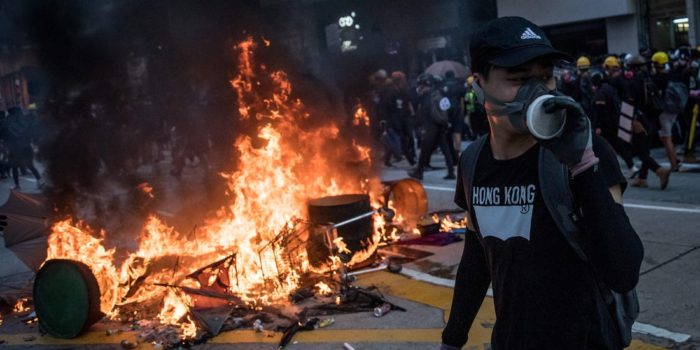Published in Japan Forward 2/1/2020
According to Vladimir Lenin, “there are decades when nothing happens and weeks when decades happen.” As Japan moves into the second year of the Reiwa era, there is a palpable sense that world history is going through a phase of acceleration, driven by the rapid economic rise of Asia and the relentless worldwide spread of the internet and social media.
Hence the intensifying confrontation between the United States and China. This may appear to have been sparked off by the unpredictable trade policies of President Donald Trump, which came as a shock after the laid-back attitude to China of his predecessors, Barack Obama and George W. Bush. In reality, the clash of wills was inevitable, as there is a fundamental incompatibility of national interests between the world’s two largest economies.
What is at stake is supremacy in two vital and interconnected areas – critical new technologies, such as A.I., 5G and robotics, and influence in Asia. As with the original Cold War, it is a struggle for control of the future. The contest will be long drawn out and multi-faceted, involving high-tech, trade, finance, soft power, political values, alliances, cyber warfare, espionage and military muscle.
Though there will be ebbs and flows in tensions, these “fundamentals” will remain in place, regardless of whether President Trump wins re-election in 2020 or not. And the logic of U.S.-China strategic competition means that Japan cannot be a passive observer, as it was largely in the first Cold War. Thanks to geography, it is on the front line, like it or not.
In recent years, Japan has been an oasis of calm in a turbulent global landscape, to the extent that the most heated political controversies concern such trivialities as the budget for the government’s annual cherry blossom viewing party. Compare that with the street violence and bitter political polarization in Hong Kong, which has been experiencing a few of those “weeks that contain decades” after two decades when, basically, nothing happened.
Hong Kong people used to be famous for their apolitical pragmatism and single-minded devotion to business, so the scenes of masked demonstrators fighting riot police were shocking to many observers. Perhaps the increasingly obvious flaws of Hong Kong’s governance should have been debated more openly before. Perhaps in recent times Hong Kong had been too calm.
In contrast, the UK’s long and heated debate about Brexit appeared chaotic, but in fact the political system was working as it should. Brexit is now a fait accompli and will soon fade from the world’s headlines.
The lesson for Japan is that crucial and divisive issues are better debated in the open than ignored until a “Lenin week” occurs. And that could happen at any time. Nothing has changed concerning the North Korean missile threat or China’s military build-up and expansionist tendencies.
Fortunately, in the coming year it is likely that Japanese citizens will have the opportunity to engage in a thorough-going debate about national security as part of the process of constitutional reform. It will be controversial and divisive, but also necessary and healthy.
Indeed, Reiwa 2 will be a year packed with politics. Prime Minister Abe may call a general election in order to establish the necessary two thirds majority in the twin houses of the Diet for passing his constitutional bill. If successful, he would then hold a referendum, the first in Japan’s history, in order to gain the public’s approval.
For the first time, ordinary Japanese citizens would be given a direct voice in their own governance. Leaving aside the specific issue in question – the legitimacy of Japan’s Self-Defense Forces – this would be a spectacular illustration of Japan’s democratic maturity.
Japan is unusual in never having amended its constitution. Globally, about 30 constitutional amendments take place every year. Germany’s constitution has been amended some 60 times since it was established in 1949; India’s over 100 times in a similar timespan.
Constitutional reform was the official policy of Japan’s Liberal Democratic Party, which was in power through nearly all that period, but nothing was attempted. Both politicians and public lacked the sense of urgency and, more important, the confidence in their own institutions to make it happen.
Circumstances have changed, as has the national mood, especially amongst younger people. Opinion surveys show that it is the older generation which is most opposed to constitutional revision, the same generation that is most opposed to increasing numbers of immigrant workers. The under-30s are much more comfortable with twenty first century realities.
2020 is the year of the Tokyo Olympics. It is to be hoped that the event passes off in fine style and the host nation secures a satisfying haul of medals. Of more lasting significance will be how Japan performs in the geopolitical Olympics that lies ahead. It will be a test of agility, stamina, strength, guile and concentration – closer to martial arts than synchronized swimming.


